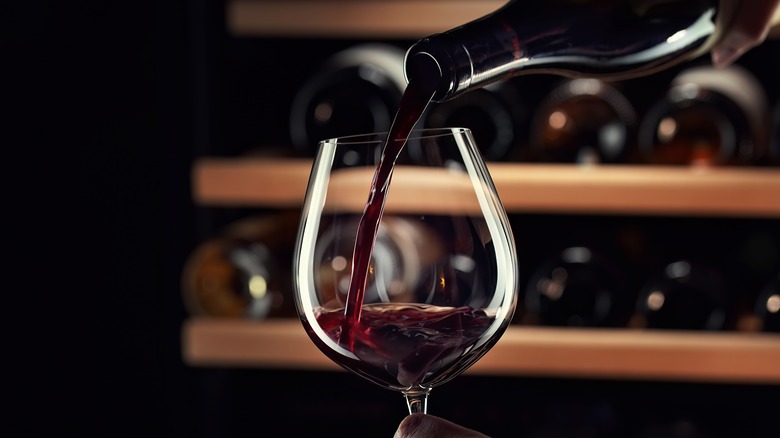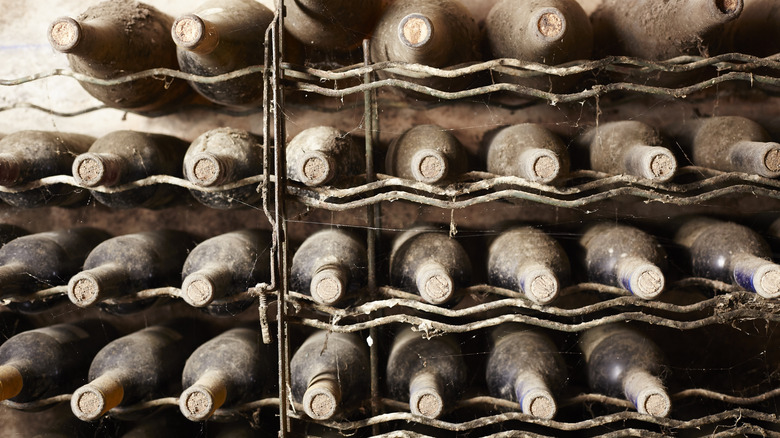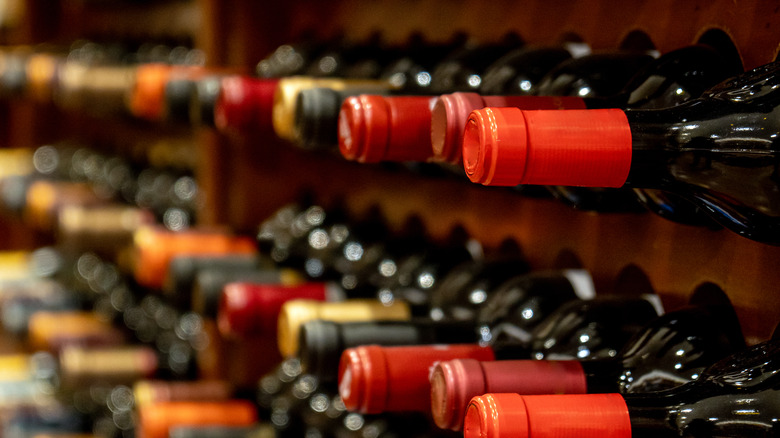Here's How Long You Can Store An Unopened Bottle Of Red Wine
It is often said that wine only gets better with time, but how true is that, particularly for red wine? Though many fine wines, or wines at the higher end of the wine market, are often sought after by collectors, investors, and enthusiasts, and do improve with age, lasting for decades at a time, every wine has a specific timeline in which it is best to consume them. Some higher-end red wines can last for 100 years, while others are best consumed after about five years. This depends on the specific properties of the grape and its wine-making process.
Red wines made from grapes with thin skins generally can be kept up to five to seven years when stored properly, but this varies by type of wine. Zinfandel, Pinot Noir, and Merlot all fall under this category, for example, but are best kept for periods of time at the shorter end of this spectrum — two to five years for Zinfandel, three to five for Merlot, and just up to five for Pinot Noir. However, wines made from grapes with thicker skins (which imparts more tannins into the wine), such as Cabernet Sauvignon or a Shiraz, on the other hand, can last between five and ten years unopened, and can even benefit from some aging.
Many wines, such as Shiraz and Cabernet Sauvignon, which are fuller-bodied, and are high in tannins, may benefit from some aging. This is because, over time, tannins mellow out, producing a much different, well-rounded wine.
Why some wines get better over time
But what is it that makes some wines age so gracefully while others wilt over time? The factors that go into aging wine are complex, and a matter of great expertise, with factors such as weather and terroir having an impact on wine's post-bottling peak. But overall, three main factors impact a wine's ability to hold up over the years. One of these elements is tannins. Tannins are bitter, astringent compounds often found in wines. Tannins act as preservatives in wine, and wines with a high tannin level can generally stand up well over the years, often calming down as time goes by, producing a much less astringent wine.
Like tannins, acidity also has a preservative effect on wine and can help add to your bottle's longevity. The acidity will also help to balance out other flavors in your wine. Similarly to acidity and tannins, though perhaps more surprisingly, sugar also helps to extend wine's shelf life, slowing down wine's aging process.
How to store your wine
However, no matter how well a red wine might age, it's no use if you don't take care to properly store your wine bottles. After all, there is a reason why fine wine collectors often store their collections in dark, cool cellars. This is because darkness and cool temperatures help to preserve bottles for extended periods of time, shielding them from influences such as light and high temperatures, which can cause any wine to age poorly.
Of course, this doesn't mean that you need a whole cellar beneath your home, but you can take some notes from a wine cellar's setup when figuring out how to store your own collection. Ideally, you should keep your wine in a cool, dark place — a basement or interior room should work. You don't need a dedicated room, but storing your wine in a cabinet so it isn't exposed to light should help prevent premature turning. And you should always store your wine on its side to prevent your cork from drying out. A dry cork can lead to premature oxidization, which can cause your wine to spoil.
Medical News Today explains that spoiled wine isn't necessarily risky to consume, though it can in rare cases cause food poisoning. Instead, it's usually just unpleasant and can taste closer to vinegar than wine. So pay attention to your wine's color and smell. If it has turned brown or taken on a cloudy hue, or if it smells off or like vinegar, you probably shouldn't drink it. If you store your wines properly though, you should be able to hold onto your favorite red wines for years before drinking them.


